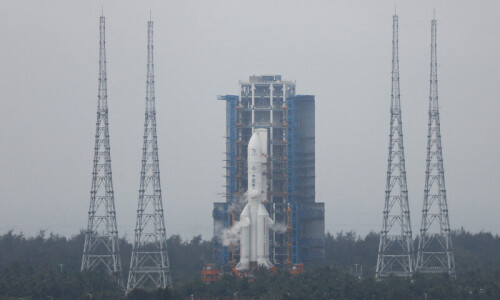 NEW DELHI, Dec 4: Russian President Vladimir Putin said on Wednesday that India and Pakistan should normalise their ties soon to remove fears of nuclear accidents including the risk of weapons of mass destruction falling into the hands of terrorists.
NEW DELHI, Dec 4: Russian President Vladimir Putin said on Wednesday that India and Pakistan should normalise their ties soon to remove fears of nuclear accidents including the risk of weapons of mass destruction falling into the hands of terrorists.
Putin and Indian Prime Minister Atal Behari Vajpayee also cautioned against any unilateral action against Iraq which they said would be violative of the UN Charter.
Discussing in detail the current situation in South Asia, primarily the poor state of India-Pakistan ties, a joint statement urged Pakistan to do more.
It stressed the “importance of Islamabad implementing in full its obligations and promises to prevent the infiltration of terrorists across the Line of Control into the state of Jammu and Kashmir and at other points across the border.”
It also urged Islamabad to “eliminate the terrorist infrastructure in Pakistan and Pakistan-controlled territory as a prerequisite for the renewal of the peaceful dialogue between the two countries.”
The statement, echoed at a subsequent news conference by Putin, urged India and Pakistan to resolve all outstanding issues in a bilateral framework as envisaged in Simla Agreement of 1972 and the Lahore Declaration of 1998.
In a comment on the Middle East, they opposed unilateral use or threat of use of force in violation of the UN Charter, as well as interference in internal affairs of other states.
“A comprehensive settlement of the situation around Iraq is possible only through political and diplomatic efforts in strict conformity with the rules of international law and only under the aegis of the United Nations,” both countries said in their joint statement.
They noted the importance of continuing intensive work with the Iraqi leadership in order to encourage it to cooperate in good faith with the United Nations.
On the situation in Afghanistan, they expressed concern at “the possible regrouping of former Taliban and Al Qaeda elements and their continuing links with their sponsors.”
Speaking at a news conference with Indian Prime Minister Atal Behari Vajpayee at the end of his official talks in New Delhi, Putin said international safeguards and peace measures between India and Pakistan were essential to prevent nuclear weapons from falling into unauthorized hands.
Vajpayee said relations with Russia were going to be elevated from a seller-buyer relationship to one of technical cooperation and joint ventures. A joint statement indicated what he meant.
“The successful launch of the GSLV (rocket) in April 2001, which used a Russian cryogenic stage, was an example of the productive potential of cooperation between India and Russia in the peaceful applications of space technology. Both sides reiterated their commitment to further expand cooperation in this area,” the joint statement said.
It also expressed satisfaction with the progress being made in the implementation of the Kudankulam Nuclear Power Project and recognised that the expanded scope of the project would meet the interests of both countries.
Russia and India will cooperate in the field of energy security including a shared strategy to tap the resources of the Caspian region, of late seen more as an American lake.
“Both sides would hold regular bilateral discussions, through appropriate mechanisms, regarding global energy production and supplies, which impact on their mutual interests,” the statement said.
They also lauded their “expanded cooperation in the field of military technical cooperation, especially joint research, development and training, as well as inter-services contacts,” saying they were consistent with the national security interests of both countries and for the cause of peace and stability in Asia and beyond.
Both sides, “as strategic partners”, reaffirmed their commitment to cooperate bilaterally and at international fora on issues relating to strategic stability for the development of a multipolar world based on a new cooperative security order.
The objectives of strengthening regional and international security as well as extending support for advancing towards internationally recognised disarmament goals, in particular, through systematic and progressive efforts aimed at reducing nuclear weapons globally with the ultimate goal of eliminating them, were considered to be of priority importance.












































Dear visitor, the comments section is undergoing an overhaul and will return soon.